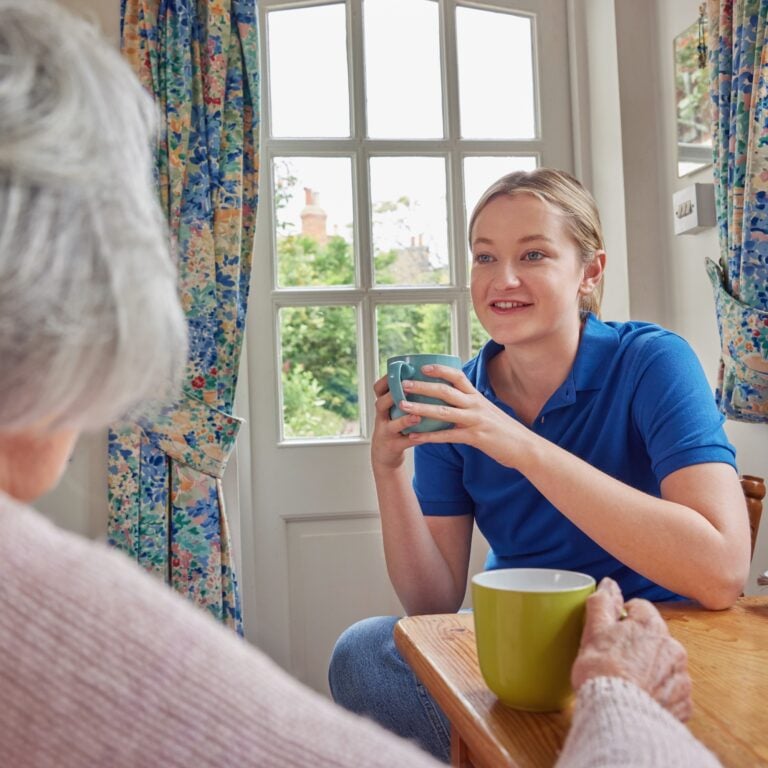
Live-in carer jobs
What is a live-in carer?
Live-in care is fast becoming one of the most popular care arrangements in the UK. With this increase in demand, we are actively seeking new candidates to become expert live-in carers for those in need.
A live-in carer is similar to a residential care home worker. The difference is that the care is provided on a one-on-one basis in the comfort of the person’s own home. As the name suggests, a live-in carer will move into their client’s home and provide care based on their unique needs and requirements.
We help individuals and families with a wide-range of care needs, including the elderly, disabled and those living with cognitive decline or complex health conditions. It’s also possible you could be providing short-term care for those recovering from an injury or surgery.
Your responsibilities
What does a live-in carer do?
The role of the live-in carer is always adapted to the needs of the client. You could be providing support in a number of areas, including:
Those with limited mobility might struggle to prepare healthy and delicious meals every day, and that’s where you come in. You’ll be responsible for creating an inspiring menu for breakfast, lunch and dinner.
An important part of the live-in carer role is to support the client in their personal care needs. This could include help with washing, dressing and grooming.
Since the client will be staying in their own home, they might need help around the house with household tasks such as doing the washing up, laundry or light housework.
One of the perks of staying in your own home is that you get to keep your beloved pets around you. The live-in carer might be required to help with pet care, including walking and feeding the pet.
Ensuring that your client takes the right medication on time may be essential to their wellbeing.
Those with limited mobility may struggle to get out and about. You can support them by accompanying them to the shops, or by making trips on their behalf.
Disability, ageing and illness can all be very isolating. A key part of the role of the live-in carer is to provide companionship and support to your client. This could be as simple as having a cup of tea and a chat every day.
If your client has complex medical needs, you may work alongside a district nurse to help deliver specialist medical care to support them and allow them to continue living in their own home.
You might help your client with simple things like getting around the house, or ensuring they can get out and about and stay connected to their wider community.
Fulfilling career path
Why become a live-in carer?
Being a live-in carer is an incredibly rewarding career path for the right candidate. Living in your client’s home will mean that you have an opportunity to get to know them very well. For those who are naturally warm and compassionate, this career choice is completely intuitive. Getting paid to care for someone in their own home is highly rewarding and engaging. You’ll enjoy the following benefits:
Have the opportunity to learn more about specialist needs and specific health conditions to help boost your earning potential.
You’re never alone when you have Cheriton Homecare on your side. Enjoy round the clock support from our incredible head office team.
As a self-employed carer, your earnings are directly linked to the care package, offering higher earning potential and the flexibility to choose how long you work.
Never worry about finding your next placement. We’ll use our network to find you the perfect placement to ensure consistent income.
We can match you to placements based on your availability, so you can enjoy better work/life balance.
We offer the essential training you need to get started in your role.
Start your new career
The application process explained
If you’re interested in becoming a live-in carer with Cheriton Homecare, the first step is to get in touch with our team. The application process will usually look like this:
- Complete the Application Form – Begin by filling out our application form to provide us with your details and experience.
- DBS and References Checked – We will conduct a DBS background check and review two satisfactory references to ensure you meet our standards.
- Zoom Call – If you meet our requirements, we will schedule a Zoom call to discuss your suitability and answer any questions you may have.
- Carer Profile Created – Once successful, we will create a professional carer profile for you, showcasing your skills and experience.
- Registration Agreement Sent – After your profile is complete, we will send you a registration agreement. Upon signing, you will be officially registered as a self-employed carer with Cheriton Homecare.
- Start Working – As a registered carer, you will have the option to accept live-in care packages that suit your availability and preferences.


Essential qualities
Skills required to be a live-in carer
Providing personalised care for someone in need of support is one of the most rewarding career paths you can choose. Not everyone is right for this role, which is why we focus on finding the individuals with the compassion, caring nature and empathy to succeed in this sector.
To be a successful live-in carer, you will need to be meticulous in your approach to your work. This is a detail oriented role that requires diligence when it comes to things like dispensing medication.
You also need to be supportive, patient and empathetic. You also need to be trustworthy – after all, clients will be inviting you into their homes, so you need to put them at ease and make them feel safe in your company. We also look for highly driven individuals who are always willing to go the extra mile to ensure things are just right for their client.
Support & guidance in your new career
Key skills for success
In this role, you’ll have the opportunity to use your skills and experience to provide high-quality care. We’re committed to helping you excel in your live-in care role. We provide the guidance and resources you need to succeed, with ongoing support from our dedicated office team. Some of the key areas you’ll be involved in include:
First Aid and Emergency Response: Being prepared to manage urgent situations with care and efficiency.
Health and Safety: Ensuring a safe and comfortable living environment for those you care for.
Manual Handling: Assisting with mobility and personal care needs in a safe and respectful manner.
Medication Management: Overseeing the correct administration of medications.
Safeguarding: Ensuring the safety and protection of vulnerable individuals.
Dementia Care: Offering compassionate and tailored care to clients living with dementia or other cognitive challenges.

Your questions answered
FAQs about live-in carer jobs
Do I have to live in the client’s home?
Yes, this is an essential part of the care arrangement. Being present in their home means that you’ll be on hand to provide care when they need it. It’s not about delivering round-the-clock care, but about being able to offer care on a flexible schedule.
Am I employed or self-employed?
All of our carers are self-employed, and we assist in arranging placements. Your weekly earnings will be based on the care package, which is tailored to meet the specific needs of the clients. This approach allows you to focus on delivering consistent care according to the agreed-upon schedule while enjoying a stable and predictable arrangement.
Will I get my own room?
Yes, we ensure that conditions are adequate to allow you to enjoy comfort and privacy while living with the client. You will have your own room and you will also have access to a bathroom and kitchen. These may be shared facilities, or you may have your own facilities.
Do I get breaks during the day?
Yes, live-in carers do get breaks, even though they are on call 24 hours a day, 7 days a week. While live-in carers tailor their routines to match the client’s daily habits—going to bed and waking up at similar times—they are entitled to 14 hours of personal time each week. This typically breaks down to about 2 hours per day. During these breaks, live-in carers are free to come and go as they please.
However, because many clients who require live-in care cannot be left alone for extended periods, carers often coordinate their breaks with times when a family member is visiting or when the client is resting, such as during a nap. Additionally, we sometimes arrange for a domiciliary carer to cover the client during these breaks, ensuring that the live-in carer can take their time off while the client’s needs continue to be met without interruption.
Do I need a driver’s licence?
While this isn’t a requirement, it can be beneficial if you have a driver’s licence. This will enable you to have greater flexibility when it comes to getting out and about or running errands. Many clients will add their live-in carer to their insurance policy, provided they have a clean driver’s licence.
What is a care plan?
A care plan is created by your manager following an assessment of the client. It helps you to understand which areas of their life they need additional support and how best to provide this. The care plan will often form the basis of how you care for the client and might even be used to create a daily schedule. If you are unsure about how to help a client, you can refer back to the care plan, or you can reach out to your manager for personalised advice.
What happens if there is an emergency?
If it is a medical emergency, you will need to call 999 and provide support until the ambulance arrives. With first aid training, you may be able to deliver life-saving support until the paramedics arrive. For any other issues, you can contact our head office for advice and support. You will never be left unsupported and you’ll always have someone you can call if you aren’t sure what to do.
